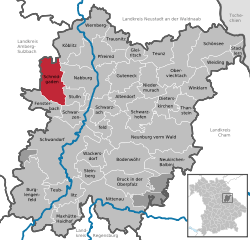Schmidgaden
From Wikipedia, the free encyclopedia
| Schmidgaden | ||
|---|---|---|
| ||
 Schmidgaden | ||
Location of Schmidgaden within Schwandorf district  | ||
| Coordinates: 49°25′N 12°5′E / 49.417°N 12.083°ECoordinates: 49°25′N 12°5′E / 49.417°N 12.083°E | ||
| Country | Germany | |
| State | Bavaria | |
| Admin. region | Oberpfalz | |
| District | Schwandorf | |
| Government | ||
| • Mayor | Johann Prifling | |
| Area | ||
| • Total | 41.23 km2 (15.92 sq mi) | |
| Elevation | 387 m (1,270 ft) | |
| Population (2012-12-31)[1] | ||
| • Total | 2,865 | |
| • Density | 69/km2 (180/sq mi) | |
| Time zone | CET/CEST (UTC+1/+2) | |
| Postal codes | 92546 | |
| Dialling codes | 0 94 35 | |
| Vehicle registration | SAD | |
| Website | www.schmidgaden.de | |
Schmidgaden is a municipality in the district of Schwandorf in Bavaria, Germany.
Geography
Schmidgaden lies in the north of the Upper Palatinate. The municipality includes the following areas: Schmidgaden, Trisching, Wolfsbach, Rottendorf, Gösselsdorf, Littenhof
History

Church in Schmidgaden
The first documentary reference goes back to the year 1123. Schmidgaden belonged to the bursary Amberg as well as to the district court of the Bavarian electorate. Due to the administrative reform in the Bavarian Kingdom, with the municipality edict the political municipality Schmidgaden arose. In 1972 the municipalities of Rottendorf, Trisching as well as parts of Gösselsdorf were incorporated.
Religions
While the majority of Schmidgaden is Catholic, Lutheran and a few other minorities can be found.
References
- ↑ "Fortschreibung des Bevölkerungsstandes". Bayerisches Landesamt für Statistik und Datenverarbeitung (in German). 31 December 2012.
External links
This article is issued from Wikipedia. The text is available under the Creative Commons Attribution/Share Alike; additional terms may apply for the media files.
